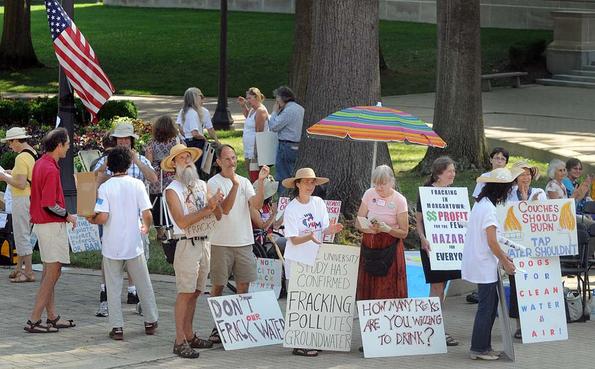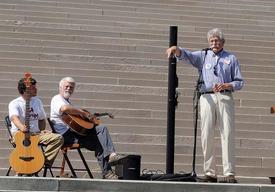|
This article originally provided by The Charleston Gazette July 11, 2011 Marcellus drilling opponents demand regulation
CHARLESTON, W.Va. -- Rose Baker and Bonnie Hall came to Charleston on Monday from their homes in Silver Hill, a rural area outside New Martinsville in Wetzel County, to tell people about what Baker calls "a total life change." "We live in a small farming community 15 miles from town," she said. "Chesapeake Energy started drilling in November 2007. They have already set up 32 well pads and have planned 48 more pads. "We have little narrow roads. If you went to town a few years ago, you might pass one car. Today, there are hundreds of tractor-trailers," Baker said. "What used to be a 30-minute drive could now take between one and six hours." About 100 people gathered on the north steps of the Capitol on Monday morning, demanding that state lawmakers regulate and control pollution from Marcellus Shale natural gas wells. They say chemicals used by drillers in hydraulic fracturing, or "fracking," causes all sorts of environmental side effects. The group West Virginians for a Moratorium on Marcellus, or WV4MOM, organized the rally to urge a moratorium on all drilling until stricter regulations are enacted. "Fracking is not new," Hall said before the rally began. "It has been going on out west for years. But our leaders didn't investigate it. I hope they regulate it. If they don't regulate it, I hope they ban it." She carried a sign reading, "How Can Ecological Harm Bring Real Economic Growth?" Marcellus Shale natural gas reserves are some of the world's biggest gas deposits. They range from western New York and Pennsylvania, down through eastern Ohio and most of West Virginia.
Mountain State deposits, typically between 6,000 and 8,000 feet underground, are concentrated in the state's northern counties. Three West Virginia cities -- Lewisburg, Morgantown and Wellsburg -- have already banned drilling for Marcellus Shale gas within their borders. "We are asking [legislators] for a moratorium, a waiting period until we get more regulations. Without this, it should be banned altogether," said Kathy Cash, a WV4MOM coordinator. "We are not here to take jobs away from West Virginians," Cash said. "But we will not become collateral damage to this industry. ... Clean drinking water, clean air and uncontaminated oil -- this is our birthright and we are prepared to defend and protect it." Cash quoted the late Sen. Robert C. Byrd, D-W.Va., who said, "It is money, money, money! Not ideas, not principles, but money that reigns supreme in American politics." Delegate Mike Manypenny, D-Taylor, supports a moratorium on new Marcellus well permits. "We need protection for our mineral and surface owners," Manypenny said. "We need to work to protect our citizens, our environment and the health of our communities." He urged his fellow legislators to increase the bonds companies post before they begin drilling to guarantee the state will have enough money "to fix the land if they abandon it. We need a single well bond for every well in West Virginia." Delegate Barbara Fleischauer, D-Monongalia, said support from Republican members of the House Judiciary Committee "was critical" to strong legislation her committee approved earlier this year. "It is ridiculous that we only have 15 [Division of Environmental Protection] inspectors for thousands of wells today," she said. "The only logical thing we can do is have a moratorium." Corky DeMarco, executive director of the West Virginia Oil and Natural Gas Association, did not attend the rally, but said, "We support reasonable regulations that provide certainty for the industry so we can move forward and produce the natural gas using horizontal drilling and hydrofracking, which is paramount to being able to drill in these shale formations." Gas producers have drilled vertically through Marcellus Shale deposits for years, DeMarco said, but have been unable to produce enough gas to market. He also said chemical additives put into water injected into the underground wells are similar to chemical additives found in cleaning products under home kitchen sinks. "This formation is probably 300 million years old," he said. "In order to be able to produce gas from these formations, you will have to put some additives in there." The Sierra Club believes a wide variety of regulations should be enacted, including:
Reach Paul J. Nyden at pjny...@wvgazette.com or 304-3348-5164.
|
|
|
West Virginia Surface Owners' Rights Organization |

